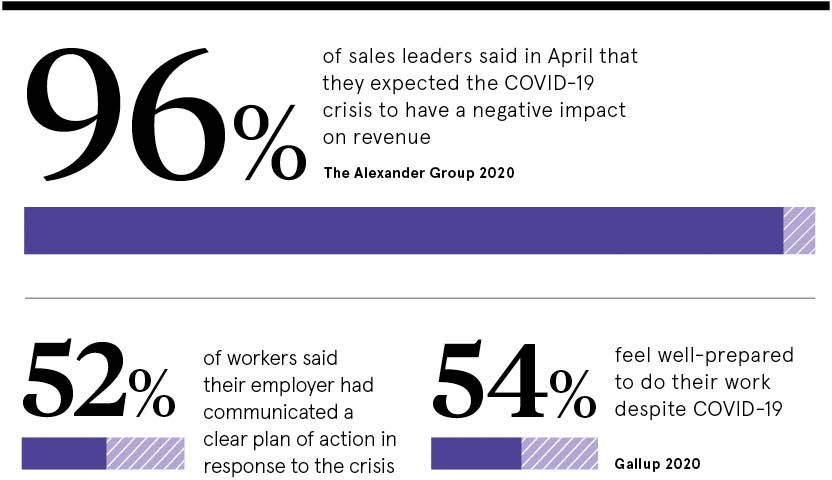In an uncertain world, effective sales leadership has never been more important to help navigate the company through choppy commercial waters and ensure its financial wellbeing.
In fact, leaders have a defining role to play in navigating beyond the current crisis. “Most importantly, in steering their company’s success in the world that emerges from it,” says Jennifer Stanley, partner at management consultancy McKinsey & Company’s marketing and sales practice.
So just what does effective sales leadership look like in these challenging circumstances and are traditional approaches enough or will new skills be required to ensure success?
In the view of David Danzig, sales director at employee recognition specialists O.C. Tanner Europe: “All the key ingredients of what constitutes effective sales leadership, such as communicating clearly on strategy, having a regular cadence, ensuring morale remains high and coaching people, all those things are still absolutely valid. It’s just that they’ve now been amplified and so are more important than ever before.”
While his number-one priority during the coronavirus pandemic has been to maintain team morale, not least because it is important for “positivity to shine through” in a sales scenario, he believes that a vital ingredient in ensuring its presence is a well-defined company strategy and purpose.
“Strategy is absolutely key and your approach to sales forms part of that,” says Danzig. “So if the sales team understands the company’s strategic direction and the role they play within that, morale remains high as the two things are linked.”
O.C. Tanner’s strategy during the crisis has been to continue cross and upselling to existing customers where possible, but to take a more softly-softly approach with early-stage prospecting, for example, by pointing people to pertinent, free-of-charge resources to help build relationships.
Taking a long-term approach to sales leadership
“It’s not the right time to be having early-stage conversations as people don’t want that when they’re dealing with huge challenges,” says Danzig. “So we made a strategic decision to act as partners and guides for now because, when the dust settles, companies will remember those that tried to help them rather than just sold to them.”
Should the global economy move into recession though, he believes it will be necessary to take a more segmented, sector-by-sector approach as not all industries or organisations will be affected in the same way.
“The companies that sell most successfully during a recession are those that do their research so they understand the organisations they’re talking to and the challenges they face,” he says. “It’s important at any time as there’s no one size fits all, but it’s more relevant than ever when times are tough.”
Connie Nam, founder and chief executive of UK jewellery brand Astrid & Miyu, has taken a similar longer-term approach to sales. After the country went into lockdown, the organisation took the decision to shift the focus from selling products and services, 60 per cent of which were generated online and the rest from retail outlets, to building up its brand and community.

Doing so has involved volunteering with charities and mentoring other small businesses, while also launching social media and email campaigns on subjects ranging from self-care to styling advice. The ability to offer consumers a more personalised web-browsing experience is also in the works.
“We’re now more geared for a soft sell and that’ll continue for the time being,” says Nam. “In future, how we approach our retail locations will also be less sales driven and more a combination of supporting online sales, becoming showrooms and a hub for click and collect, with brand ambassadors hanging out with customers. It’ll be much more of an experience than it was.”
Candace Lun Plotkin, director of knowledge at McKinsey & Company’s marketing and sales practice, agrees that the key to effective sales leadership is not just about “navigating the now”. Instead it also entails planning for recovery in whatever form that takes and finding ways to shape what she calls the “next normal”.
Reimaging the future
This means sales leaders need to evaluate what the future holds so they can “act decisively with speed and agility” and be “ready to address demand” when the first green shoots appear, she says.
But it also involves exploiting the “unique opportunity” offered by the crisis to start reimagining the future. Software tools and data can help by providing insights into possible new ways of interacting with customers and identifying where there is potential demand for products and services to inform sales strategy for the longer term.
Another possible way of reimagining things to come is by engaging an organisation’s “secret army” to assist in the sales process, says Isobel Rimmer, founder of Masterclass Training and author of Natural Business Development.
This secret army consists of everyone from technical experts and pre-sales consultants to customer service agents, “99 per cent of whom don’t want to be seen as salespeople, but who regularly talk to customers and influence the relationship”, she says.
The idea is that while, particularly in a recession, it may be difficult for an individual salesperson to generate £500,000-worth of sales, if 50 of their colleagues can each identify a £10,000 lead as part of their normal customer interaction, it becomes possible to spread the risk.
“Salespeople take on more of an internal collaboration and orchestration role as there’s potentially a broader mix of people involved in the sales process, although they’re still the ones who open up the opportunity, nudge it along and close the deal,” says Rimmer.
Coming up with this kind of new idea is, in fact, how Danzig at O.C. Tanner is currently defining high-performance among his team.
“Hitting targets and the like is still important, but this year I see a high performer as being someone who looks at things a bit differently or who has great ideas for taking a slightly different approach. It’s about showing a bit of boldness and trying new things, which is crucial during these challenging times,”
he concludes.
